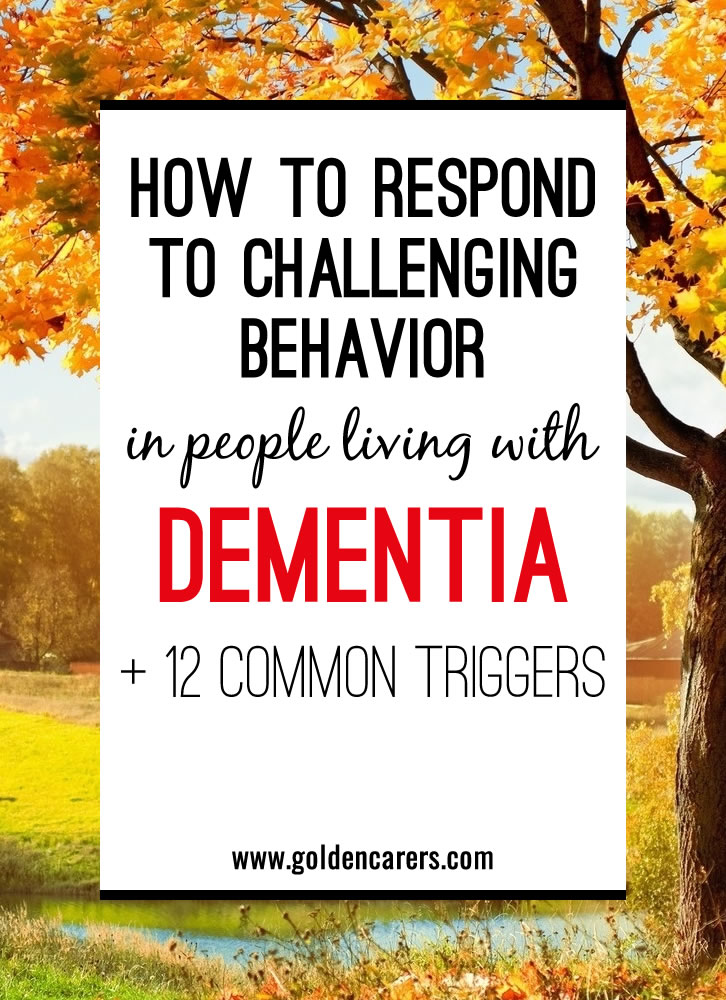
Challenging behavior is common in people living with dementia and is considered one of the most difficult issues facing staff in residential care and caregivers at home.
It is important to try and understand why the person is behaving in a particular way and remember that it is the behavior that is challenging and not the person.
Related Activities
Comments Post a Comment
 15th Mar 2020
Activities
15th Mar 2020
Activities
 15th Mar 2020
Diversional Therapist
15th Mar 2020
Diversional Therapist
Don’t despair, we all have these experiences along the course of our careers.

 15th Mar 2020
Activity Director
15th Mar 2020
Activity Director
Have you tried positive reinforcement??
Find out what she really likes and reward her when her behavior is appropriate
You may have to do this in small increments
Perhaps you can reward the assisted living residents for letting her participate in their activity even though they don’t want her to be there
When she leaves give them some kind of treat that you know they will like
Also maybe you can have a two-part activity
Tell the assisted living residence that this person will join them for the first half and then you’ll take a break and just the assisted living residents will partake in the second part
The better the behavior is of the problem resident the longer you can have the first half last
Perhaps some of these ideas will help you too
https://www.goldencarers.com/how-to-decrease-problem-behaviors/5056/
The truth of the matter is that sometimes no matter what you do the problem behavior will still exist but give it time and try your best
You can contact your supervisor about the situation maybe this person has some ideas
Good luck
 4th Nov 2015
Life-style co ordinator/PCA
4th Nov 2015
Life-style co ordinator/PCA
I also have a resident who spits constantly some days are worse than others but I was surprised to see that during her 80th birthday celebrations, her family came in and she didn't spit at all! I'm not sure if the cards will help, will certainly give it a go...also other residents find it hard being in the same room as her so she spends a lot of time in her room. I wish there was something I could do to change her environment.
Really appreciate any help with this.
Many thanks Annie

 5th Mar 2015
activities coordinator
5th Mar 2015
activities coordinator
 17th Oct 2014
Diversional Therapist
17th Oct 2014
Diversional Therapist
 8th Oct 2014
Community Services Facilitator
8th Oct 2014
Community Services Facilitator
When going out he will spit a lot in the car and at the carer.
Spits on changeover of carers, mostly on his shirt but sometimes at carers and people.
It appears at times attention seeking behaviour or anxious/excited about something, his way of communicating..
What would be a way to handle this behaviour..?
any thoughts would be appreciated.
 2nd Apr 2014
Diversional Therapist
2nd Apr 2014
Diversional Therapist

 7th Nov 2013
Diversional Therapist
7th Nov 2013
Diversional Therapist
It is common for people living with dementia to be suspicious of neighbours and staff. Sometimes they come up with unreasonable accusations. You may try validation therapy; ask questions about the item that is missing; how she used it, for what purpose, if the item reminds her of someone and so on. If this fails, use some strategic distraction; something that worked in the past or invite her for a game or visit someone she likes. Unfortunately, sometimes nothing works and they stay miserably for a while. You must remember that it is the illness that brings this sort of behaviour; they can't help it.
All the best,
Solange
 7th Nov 2013
DIVERSIONAL THERAPIST
7th Nov 2013
DIVERSIONAL THERAPIST

 7th Nov 2013
Diversional Therapist
7th Nov 2013
Diversional Therapist
Solange
 6th Nov 2013
Live in caregiver
6th Nov 2013
Live in caregiver
 6th Nov 2013
DIVERSIONAL THERAPIST
6th Nov 2013
DIVERSIONAL THERAPIST

 12th Oct 2012
Diversional Therapist
12th Oct 2012
Diversional Therapist
- Escort your client on a walk to burn energy three times a day
- Take client to a sensory room to wander, a multi-sensory experience may reduce restlessness
- See if he is interested in pruning shrubs, watering plants, taking a dog for a walk
 5th Oct 2012
Activities Co-Ordinator
5th Oct 2012
Activities Co-Ordinator
He will not sit for any length of time in a chair or bed.
He keeps trying to get up and walk.
I have tried various distractions to no avail, he is not interested in any activity at all.
Every time this person tries to walk he falls over and injures himself.
Could you help me please.
regards Anne


 10 Reasons Why Your Community Needs More Plants
10 Reasons Why Your Community Needs More Plants
 25 Fun Summer Trip Ideas
25 Fun Summer Trip Ideas
 13 Ways to Include Math In Your Activity Calendar
13 Ways to Include Math In Your Activity Calendar
 6 Spring Art Activities Your Residents Will Love
6 Spring Art Activities Your Residents Will Love


Periodically I would have a kindness group
Ask the residents what it means to be kind
Ask them to give examples of how they are kind
I have found that some residents can be mean without meaning to be and just a friendly reminder of being kind is very helpful here are some kindness activities
https://www.goldencarers.com/kindness-poems/3851/
https://www.goldencarers.com/heart-of-kindness/4324/
World kindness day is in November but you could have a kindness day every month or every week to remind the residents especially your resident with difficult behaviors to be kind to everyone
Forgiveness day is in August but you could also have that as part of your calendar as well here are some ideas for that
https://www.goldencarers.com/forgiveness-activities/5111/